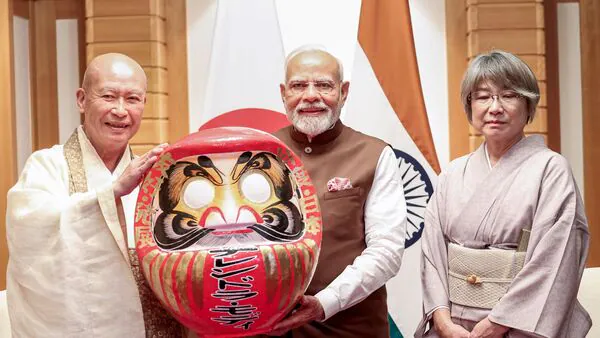PM Modi Receives Daruma Doll in Japan: A Gift Rooted in India’s Spiritual Legacy
- MGMMTeam

- Aug 29, 2025
- 3 min read
On August 29, 2025, during his visit to Japan, Prime Minister Narendra Modi was presented with a Daruma doll by Rev. Seishi Hirose, the chief priest of the historic Shorinzan Daruma-ji Temple in Takasaki. The moment was not merely ceremonial; it symbolized the centuries-old spiritual and cultural connections between India and Japan. The doll, deeply revered in Japanese tradition, carries origins that trace back to India, making the gesture a powerful statement of shared heritage.

The Symbolism of the Daruma Doll
The Daruma doll, a round and hollow figure made of papier-mâché, represents resilience, persistence, and good fortune in Japanese culture. Its design reflects the Japanese proverb “Nanakorobi yaoki”—which translates as “fall down seven times, get up eight.” This captures the very essence of determination and the spirit of never giving up.
Traditionally, the doll’s eyes are left blank. When someone sets a goal, they paint one eye, and once the goal is achieved, the second eye is filled in. This practice has made the Daruma an important symbol in personal ambitions, political campaigns, and business ventures across Japan.
Indian Origins: Bodhidharma and the Zen Connection
What makes the Daruma doll especially significant in the context of Modiji’s visit is its Indian origin. The figure represents Bodhidharma, a Buddhist monk from Kancheepuram in southern India, who travelled to China in the 5th or 6th century and later influenced Japanese Zen traditions. Known as Daruma Daishi in Japan, Bodhidharma is remembered for his intense meditation practice. Legends state that he meditated for nine years facing a wall, which caused the loss of his limbs—a story reflected in the doll’s limbless, round design.
Bodhidharma’s philosophy not only shaped Zen Buddhism but also left a deep cultural imprint across East Asia. The Daruma doll stands as a physical reminder of this Indian monk’s enduring influence on Japanese spirituality.
Shorinzan Daruma-ji Temple: The Birthplace of Tradition
The Shorinzan Daruma-ji Temple in Takasaki, where the tradition of the doll began in 1697, remains the spiritual heart of Daruma culture. Today, the city of Takasaki produces nearly 80% of Japan’s Daruma dolls and is fondly known as the “Lucky Town.” The temple holds annual ceremonies where old Daruma dolls are burned in a sacred fire, symbolizing the completion of aspirations, while new dolls are purchased for fresh goals. This cycle reflects renewal, hope, and continuity of faith.
More Than a Souvenir: A Diplomatic Message
The gift of the Daruma doll to Prime Minister Modi was not just an exchange of tokens but a reminder of the civilizational bond between India and Japan. As the land where Buddhism originated, India holds a profound connection to the spiritual traditions that spread across Asia. For Japan, presenting this doll was both a gesture of respect and an acknowledgment of shared cultural history.
The Prime Minister’s Office also highlighted the symbolic nature of the gift, stating that it reaffirmed the deep civilizational ties between the two countries. Such gestures reflect how cultural diplomacy can strengthen political and economic relationships by rooting them in shared traditions.
The Wider Cultural Impact of Daruma
Beyond its religious and spiritual symbolism, the Daruma doll has also become a part of Japan’s popular culture. Its colors often carry different meanings: red for luck, gold for prosperity, green for health, and white for love. The doll’s facial hair is crafted in the shape of a crane and turtle, symbols of longevity in Japanese folklore. Even today, Daruma dolls are widely used during elections, at the opening of businesses, and in households to inspire hope and perseverance.
Conclusion
The presentation of the Daruma doll to Prime Minister Modi was far more than a simple diplomatic gesture. It was a cultural offering deeply rooted in India’s own heritage, reminding the world of the historical ties that connect India and Japan. Through this symbolic exchange, both nations celebrated resilience, faith, and determination—values embodied in the Daruma doll itself. As India and Japan continue to deepen their partnership, this gift stands as a reminder that their modern relationship rests upon a foundation built over centuries of shared spiritual and cultural history.




Comments